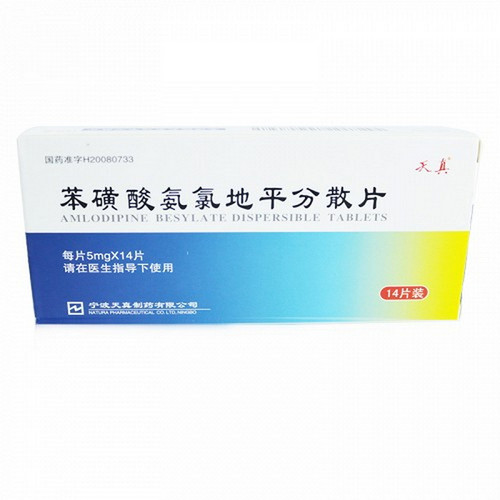Product Overview
[Drug Name]
Generic Name: Amlodipine Besylate Tablets
Trade Name: Sunflower Pharmaceutical Amlodipine Besylate Tablets 5mg*14 Tablets
Pinyin Full Code: KuiHuaYaoYe BenHuangSuanAnLvDiPingPian 5mg*14 Tablets
[Main Ingredients]
Amlodipine Besylate
[Indications/Main Functions]
1. Hypertension: This product is indicated for the treatment of hypertension. It can be used alone or in combination with other antihypertensive medications. Hypertension control is part of comprehensive cardiovascular risk management, which may include lipid control, diabetes management, antithrombotic therapy, smoking cessation, physical exercise, and sodium restriction. Increases in systolic or diastolic blood pressure increase cardiovascular risk. At higher baseline blood pressure levels, the absolute risk increase per mmHg increase is greater. The relative magnitude of risk reduction achieved by lowering blood pressure is similar among individuals with varying absolute cardiovascular risk. For patients with severe hypertension, even a small reduction in blood pressure can provide significant clinical benefit. For adult patients with hypertension, lowering blood pressure generally reduces the risk of cardiovascular events, primarily stroke and myocardial infarction. 2. Coronary Artery Disease (CAD) Chronic Stable Angina: This product is indicated for the symptomatic treatment of chronic stable angina. It can be used alone or in combination with other anti-anginal drugs. Vasospastic Angina (Prinzmetal's or variant angina): This product is indicated for the treatment of confirmed or suspected vasospastic angina. It can be used alone or in combination with other anti-anginal drugs. In patients with angiographically confirmed CAD but an ejection fraction ≥40% and no heart failure, this product can reduce the risk of hospitalization for angina and the need for coronary revascularization.
[Specifications]
5mg*14 tablets
[Dosage and Administration]
The initial dose for the treatment of hypertension and angina is approximately 5 mg once daily. The dose can be increased based on the patient's clinical response, up to a maximum of 10 mg once daily. No dose adjustment is required when this product is used in combination with thiazide diuretics, beta-blockers, and angiotensin-converting enzyme inhibitors.
[Adverse Reactions]
The 10 mg/day dose of this product was well tolerated. In placebo-controlled clinical trials for the treatment of hypertension or angina, the most common side effects were headache, edema, fatigue, drowsiness, nausea, abdominal pain, flushing, palpitations, and dizziness.
[Contraindications]
This product is contraindicated in patients with allergies to dihydropyridine calcium channel blockers. In non-steroidal anti-inflammatory drugs (NSAIDs), coadministration of this product with warfarin did not affect changes in the warfarin prothrombin time.
[Precautions]
1. Warning: A very small number of patients, particularly those with severe coronary artery obstructive disease, may experience increased frequency, prolonged duration, and/or worsening of angina pectoris, or acute myocardial infarction, when initiating calcium channel blocker therapy or increasing the dose. The mechanism of action is currently unknown. 2. Because the vasodilatory effect of this drug develops gradually, rare cases of acute hypotension have been reported following administration of this drug. However, caution should be exercised when using this drug in combination with other peripheral vasodilators in patients with severe aortic stenosis. 3. Use in Patients with Heart Failure: Calcium channel blockers should be used with caution in patients with congestive heart failure. In a long-term, placebo-controlled study (PRAISE-2) in patients with non-ischemic heart failure (NYHA class II-IV), although the incidence of worsening heart failure was not significantly different compared with placebo, there was an increase in reports of pulmonary edema associated with amlodipine. 4. Use in Patients with Impaired Hepatic Function: As with all other calcium channel blockers, the half-life of this drug is prolonged in patients with impaired hepatic function, but the recommended dose for this drug in such patients has not been established.Therefore, caution should be exercised in such patients. 5. Use in Patients with Renal Failure: Changes in amlodipine plasma concentrations do not correlate with the degree of renal impairment; therefore, a normal dose can be used. This drug is not dialyzable.
[Pediatric Use]
The recommended dose of this drug for hypertensive children aged 6 to 17 years is 2.5 mg to 5 mg once daily. There are no studies on daily doses of this drug exceeding 5 mg in pediatric patients. There are no data on the effect of this drug on blood pressure in children under 6 years of age.
[Elderly Use]
The time to peak plasma concentration of this drug is similar in elderly and younger patients. In elderly patients, the increased area under the curve (AUC) and prolonged elimination half-life contribute to a trend toward decreased elimination. Similar doses of amlodipine have been reported to be well tolerated by elderly patients as in younger patients. Therefore, a normal dose can be used in elderly patients. However, it is better to start with a smaller dose and then gradually increase the dose.







